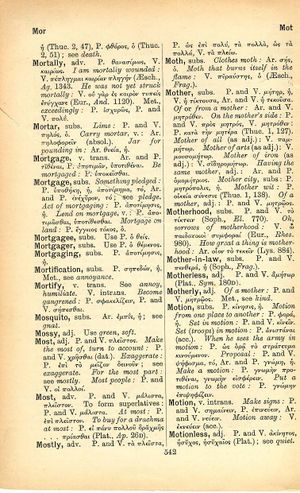most: Difference between revisions
From LSJ
Ἡ πατρίς, ὡς ἔοικε, φίλτατον βροτοῖς → Homini, ut videtur, patria res dulcissima est → Die Heimat ist der Menschen Liebstes, wie es scheint
m (Text replacement - "Plat., <b class="b2">A</b>" to "Plat., A") |
(nlel) |
||
| Line 11: | Line 11: | ||
<b class="b2">At most</b>: P. ἐπὶ πλεῖστον. | <b class="b2">At most</b>: P. ἐπὶ πλεῖστον. | ||
<b class="b2">To buy for a drachma at most</b>: P. εἰ [[πάνυ]] πολλοῦ δραχμῆς . . . πρίασθαι (Plat., Ap. 26D). | <b class="b2">To buy for a drachma at most</b>: P. εἰ [[πάνυ]] πολλοῦ δραχμῆς . . . πρίασθαι (Plat., Ap. 26D). | ||
}} | |||
{{nlel | |||
|nleltext=[[γλεῦκος]], [[τρύξ]] | |||
}} | }} | ||
Revision as of 10:05, 10 January 2019
English > Greek (Woodhouse)
adj.
P. and V. πλεῖστος. Make the most of, turn to account: P. and V. χρῆσθαι (dat.). Exaggerate: P. ἐπὶ τὸ μεῖζον δεινοῦν; see exaggerate. For the most part: see mostly. Most people: P. and V. οἱ πολλοί. adv. P. and V. μάλιστα, πλεῖστον. To form superlatives: P. and V. μάλιστα. At most: P. ἐπὶ πλεῖστον. To buy for a drachma at most: P. εἰ πάνυ πολλοῦ δραχμῆς . . . πρίασθαι (Plat., Ap. 26D).

